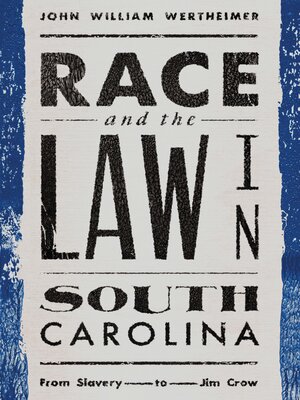
Sign up to save your library
With an OverDrive account, you can save your favorite libraries for at-a-glance information about availability. Find out more about OverDrive accounts.
Find this title in Libby, the library reading app by OverDrive.



Search for a digital library with this title
Title found at these libraries:
| Library Name | Distance |
|---|---|
| Loading... |
This first title in the "Law, Literature & Culture" series uses six legal disputes from the South Carolina courts to illuminate the complex legal history of race in the U.S. South from slavery through Jim Crow. The first two cases—one criminal, one civil—both illuminate the extreme oppressiveness of slavery. The third explores labor relations between newly emancipated Black agricultural workers and white landowners during Reconstruction. The remaining cases investigate three prominent features of the Jim Crow system: segregated schools, racially biased juries, and lynching, respectively. Throughout the century under consideration, South Carolina's legal system obsessively drew racial lines, always to the detriment of non-white people, but it occasionally provided a public forum within which racial oppression could be challenged. The book emphasizes how dramatically the degree of legal oppressiveness experienced by Black South Carolinians varied during the century under study, based largely on the degree of Black access to political and legal power.
"Recent arguments in African American History have emphasized the theme of continuity. . . . Race and Law in South Carolina recovers the theme of change over time by showing just how things have changed, and it does so through patient, thick description." —H. Robert Baker, Georgia State University
"This book and its concomitant student project is an exciting endeavor. . . . The cases are captivating and accessibly written, making this a possible college classroom read." —Vanessa Blanck, Rowan University
"Recent arguments in African American History have emphasized the theme of continuity. . . . Race and Law in South Carolina recovers the theme of change over time by showing just how things have changed, and it does so through patient, thick description." —H. Robert Baker, Georgia State University
"This book and its concomitant student project is an exciting endeavor. . . . The cases are captivating and accessibly written, making this a possible college classroom read." —Vanessa Blanck, Rowan University







